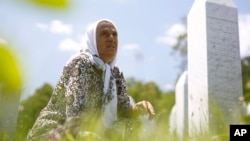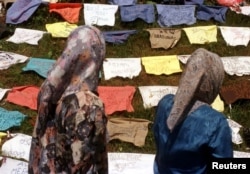Foreign dignitaries were starting to arrive in Bosnia on Friday to mark the 20th anniversary of Europe's worst massacre since World War II and attend the funeral of 136 newly found victims.
Turkish Prime Minister Ahmet Davutoglu and Jordan's Queen Noor were among early arrivals, and former U.S. President Bill Clinton was expected later in the day. Foreign Affairs chief Federica Mogherini is planned to represent the European Union at Saturday's commemorations.
Some 50,000 people are expected to attend ceremonies mourning the 8,000 Muslim men and boys killed in the eastern Bosnian town of Srebrenica, which had been declared a safe haven for civilians by the United Nations. The event includes a funeral for 136 recently found victims identified through DNA analysis
On July 11, 1995, Serb troops overran the Muslim enclave. Some 15,000 men tried to flee through the woods toward government-held territory while others joined the town's women and children in seeking refuge at the base of the Dutch U.N. troops who were deployed to protect the town.
But the United Nations did nothing to stop the fall of Srebrenica and the outnumbered and outgunned Dutch troops could only watch as Serb soldiers separated about 2,000 men from women for killing and later hunted down and killed another 6,000 men in the woods.
The remains of Srebrenica victims are still being found in mass graves. So far, remains of some 7,000 victims have been excavated from 93 graves or collected from 314 surface locations and identified through DNA technology.
Remains of more than 6,000 were buried again at the Potocari Memorial Center where Saturday's events will unfold, just across the road from the former U.N. base.
Bosnian Serbs deny the killings were "genocide" and their leader, Milorad Dodik, called last weekend the number of victims a "lie.'"
But Serbian Prime Minister Aleksandar Vucic will be representing Serbia at the commemoration. He said he wanted to bow his head before the victims of the "horrible crime".
This week, a proposed U.N. Security Council over a resolution that called the crime "an act of genocide" — as two international courts already have labeled it — was vetoed by Russia.
Leaders of the Bosnian Serbs and Serbia, who have close religious and cultural ties to Russia, have lobbied President Vladimir Putin to vote "no." U.S. Ambassador to the U.N., Samantha Power said the veto was "a further stain on this council's record."
In Serbia, police have banned gatherings honoring the victims of the massacre as well as those by ultranationalists. Liberal Serbian groups had planned to have some 7,000 people lie down in front of the country's parliament on Saturday. Several Serb ultranationalist groups, who deny that it the killings were genocide and claim that that fewer than 8,000 people died, had pledged to disrupt the event.
The 1992-95 war in Bosnia, pitting Christian Orthodox Serbs against Bosnian Muslims and Croatian Catholics, left more than 100,000 people dead and millions homeless. The Serbs, who wanted to remain in the Serb-led Yugoslavia, fought against the secession of Bosnia and Croatia from the former federation.
Bosnia's war ended with a U.S.-brokered peace agreement that divided the once ethnically mixed country in two ministates — one run by the Serbs, the other shared by the Bosniaks and Croats. They are linked by a common government, parliament and three-member presidency where each group holds a veto.
Dusan Stojanovic contributed from Belgrade, Serbia.








